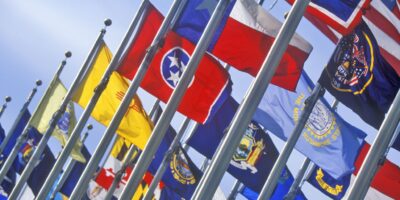Life Is Completely Different, Except for the Bureaucrats

In the last 4 weeks, I have tried to stay positive by thinking about how the coronavirus crisis has revealed once again the incredibly generous spirit of the American people and the phenomenal creativity of the private sector. I have even tried to highlight some of the freedom-enhancing steps the various governments throughout the U.S. have taken to help respond to COVID-19. But today I am in no mood for optimism.
In spite of the crushing events that are unfolding before our eyes, and in spite of the lives lost to this virus—some of them in part due to the ineptitude of bureaucrats at the CDC and FDA – politicians and bureaucrats continue to push and implement the most infuriating and misguided regulations and policies they can dream up. Here are a few examples.
Let’s start at the federal level. Peter Navarro, the president’s advisor for all bad economic policies, announced that the president was preparing an executive order to reduce U.S. reliance on foreign-made medical supplies. This is the same Peter Navarro who would like nothing more than to put in place an export ban for medical supplies and to bring our supply chain back home.
I understand why these policies appeal to those who never think beyond the superficial aspects of proposals such as Mr. Navarro’s. But all the scholars (like Don Boudreaux and other AIER writers) who do account for policies’ unintended consequences actually know that this idea is terrible because ‘Buy American’ regulations increase the costs of goods purchased by the government – higher costs that are either passed down to consumers via increased prices or to taxpayers via heavier tax burdens.
Dan Ikenson writes this, for instance:
If patriotism is the last refuge of scoundrels, where will President Trump turn when his “America First” policies lay waste to the very people he professes to be helping?…
Cordoning off the estimated $1.7 trillion U.S. government procurement market to U.S. suppliers would mean higher price tags, fewer projects funded, and fewer people hired. In today’s globalized economy, where supply chains are transnational and direct investment crosses borders, finding products that meet the U.S.-made definition is no easy task, as many consist of components made in multiple countries. And by precluding foreign suppliers from bidding, any short-term increases in U.S. economic activity and jobs likely would be offset by lost export sales – and the jobs that go with them – on account of copycat protectionism abroad.
Then we have the FDA. It has, let’s cheer, relaxed some rules and is trying to expedite approval for possible COVID-19 cures, testing, and vaccines. And yet, apparently, it can’t stop being a precautionary machine that gets in the way of Americans’ fight against this virus. Take the current shortage of N95 masks. The FDA (and the CDC) has yet to remove the required certification that suppliers must get to be able to send their masks to hospitals. Reason’s Eric Boehm writes:
“Hospitals are only allowed to purchase masks from suppliers certified by both the CDC and the Food and Drug Administration (FDA)—though they can accept donations from any source (more on that in a moment). Many foreign companies that make face masks lack those certifications, which limits the imported supply available to meet America’s rising demand.
Even suppliers who are certified to sell masks to Americans have to navigate a weeks-long bureaucratic process before orders can be fulfilled. Suppliers who aren’t certified by those federal agencies can’t legally bring their products into the United States.”
For more on this matter read this and this. The FDA is also getting in the way of distilleries that now produce hand sanitizers. Really.
Then there’s the FDA’s decision to stop four American producers from making their at-home-tests available to consumers. And if you really want to get angry read some of the emails CDC’s employees were sending each other about COVID-19, including one from January 28th by the director, Dr. Robert Redfield, assuring his employees that “the virus isn’t spreading in the US at this time.”
Moving on to the states. Now would be a great time to remove all occupational-licensing requirements. Some states are definitely relaxing these restrictions, especially for health-care professionals. Such restrictions are counterproductive during normal times but downright idiotic during times of crisis.
Yet the state of Arizona’s Board of Psychologist Examiners remains obstinate. Over at In Defense of Liberty, Jon Riches reports how the bureaucrats there have instead moved to deny a license to practice psychology to an experienced and respected psychologist. Never mind that during these stressful times many people are really feeling the need to get support from mental-health professionals. Bureaucrats do not care.
And then there’s the state of Hawaii, whose overlords have decided that, during this crisis, less transparency from politicians and bureaucrats is okay. Timothy Sandefur writes:
The order temporarily nullifies several state laws, but these two transparency measures in particular—the Uniform Information Practices Act (UIPA) and the Sunshine Law—raise special concerns. The UIPA is Hawaii’s version of the Freedom of Information Act, and it requires the government to turn over records relating to everything from environmental tests to government contracting to information about who’s participating in state loan programs. And the Sunshine Law requires meetings by “all boards” in the state to be “open to the public” and requires these officials to “afford all interested persons an opportunity to submit data, views, or arguments, in writing, on any agenda item.”
Okay then. Meanwhile in Oregon, teacher unions are blocking public school kids from getting an education online while their schools are closed. You read that correctly. This absurdity is so even though charter school kids are allowed to get their education online, and charter schools have offered to educate the public school’s kids during this pandemic.
In California, the governor has ordered non-essential businesses to close, and has given great discretion to local sheriffs as to whether or not that applies to gun dealers. Jacob Sullum explains the consequences for some of Californians’ Second Amendment right:
Newsom’s decision, which allowed Los Angeles County Sheriff Alex Villanueva to unilaterally ban the sale of firearms and ammunition, illustrates how readily politicians ignore constitutional rights in the very circumstances where they matter most.
Villanueva’s ban, which several gun rights groups challenged in a federal lawsuit last Friday, was inconsistent with recent guidance from the Department of Homeland Security as well as the Second Amendment. In an advisory published on Saturday, the department added firearm retailers to its definition of the “essential critical infrastructure workforce,” which Newsom explicitly exempted from his order.
And then there’s the issue of the intrastate travel bans currently in place in several states. As Jeff Miron at the Cato Institute points out:
In the U.S., bans on travel and other daily activities are becoming the new normal. Florida, Rhode Island, and Oklahoma are among 15 states that have issued orders restricting interstate travel. Reasonable people can disagree about whether particular emergency powers are worth the risks they entail. But we should all recognize the risks.
It’s worth noting that many states have ordered a shutdown for weeks at a time without feeling the need to explain why and how they reached this conclusion. This is the case in Virginia, where I live and where the governor suddenly ordered a shelter-in-home order until June 10th. He also ordered schools to remain closed until the beginning of the next school year in August.
There is much more about idiotic state actions, but it’s time to move to the local government level. First, you have various cities that have ordered closures of most stores and restaurants without allowing them to find a safe way to keep their business going. That means that if these businesses can operate from home, they aren’t permitted to do so.
It gets better – or worse. We know that many local governments have freedom-suppressing regulations that make it a crime to work from home. If it is absurd during normal times, it is even more idiotic during a government-ordered quarantine. Yet, that’s what Springfield, Virginia is doing. Christina Sandefur writes:
Just a few weeks ago, a Springfield, Virginia, woman who ran an internet clothing business from her home was forced by the city to shut down because the local zoning doesn’t permit “retail sales establishments” in people’s homes—even if those sales only occur online. She’s already lost $30,000 of her income. In these times of great uncertainty, we should be doing everything we can to make it easier for people to find and sustain work—not turning honest, hardworking people into outlaws.
The lesson of the story is that during a pandemic life as we knew it is gone, but bureaucrats as we know them stay annoyingly the same.












